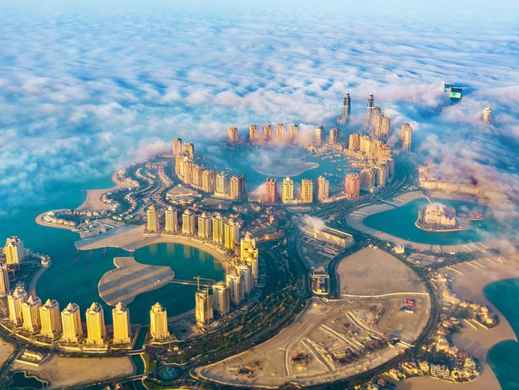


Djibouti
Africa
/
Djibouti
Djibouti, a small but captivating nation nestled in the Horn of Africa, beckons adventurous travelers with its unique blend of natural wonders and cultural riches. This strategic gateway to the Red Sea boasts a landscape of stark contrasts, from the shimmering waters of Lake Assal, Africa's lowest point, to the rugged peaks of the Goda Mountains. Visitors can explore the bustling capital, Djibouti City, with its vibrant markets and French colonial architecture, or venture into the otherworldly landscapes of the Danakil Desert.
For those seeking an off-the-beaten-path experience, Djibouti offers unparalleled opportunities for eco-tourism and wildlife encounters. The Gulf of Tadjoura is renowned for its population of whale sharks, drawing divers and snorkelers from around the world. Nature enthusiasts can trek through the Day Forest National Park, home to rare species like the critically endangered Djibouti francolin. Whether you're interested in history, outdoor adventures, or simply soaking in the unique atmosphere of this often-overlooked destination, Djibouti promises an unforgettable journey through one of Africa's most intriguing corners.

Travel Tips for Djibouti
What you need to know before traveling here
Practical Tips for Djibouti
Things to prepare and best way to visit
The best time to visit Djibouti is from November to April, during the cooler dry season. Temperatures are more comfortable, ranging from 25°C to 35°C (77°F to 95°F), making it ideal for outdoor activities and sightseeing. This period also offers better visibility for diving and snorkeling in the Gulf of Tadjoura and Lake Assal.
Djibouti is generally considered safe for tourists, with a relatively low crime rate. However, as with any travel destination, it's important to exercise caution and be aware of your surroundings. Avoid walking alone at night, keep valuables secure, and stay informed about current events. It's advisable to check your government's travel advisories before visiting and to respect local customs and laws.
Djibouti offers several unique attractions. Lake Assal, the lowest point in Africa and third-lowest on Earth, is a salt lake with stunning turquoise waters. The Gulf of Tadjoura is perfect for diving and whale shark watching. The Day Forest National Park showcases rare flora and fauna. Djibouti City's European Quarter and central market are worth exploring. Don't miss the otherworldly landscapes of Lake Abbe with its limestone chimneys.
Most foreign visitors need a visa to enter Djibouti. E-visas are available for many nationalities and can be obtained online before travel. The e-visa is valid for 30 days and allows for single or multiple entries. Some nationalities may be eligible for visa on arrival, but it's best to check the latest requirements with the Djiboutian embassy or consulate in your country before traveling.
Travelers to Djibouti should be up-to-date on routine vaccinations, including measles-mumps-rubella (MMR), diphtheria-tetanus-pertussis, varicella, and polio. Additionally, hepatitis A and typhoid vaccinations are recommended. Depending on your activities and length of stay, your doctor may also suggest vaccinations for hepatitis B, rabies, and yellow fever. Malaria prophylaxis may be necessary, especially if traveling to rural areas.
See All Practical Tips for Djibouti

Explore Djibouti
Create your itinerary with our top picks below

Travel Tips for Djibouti

Explore Djibouti
More Destination Near Djibouti


























 Facebook
Facebook Instagram
Instagram TikTok
TikTok Youtube
Youtube Telegram
Telegram
